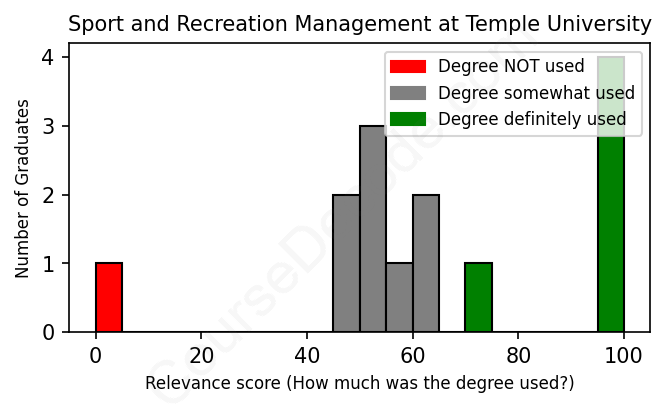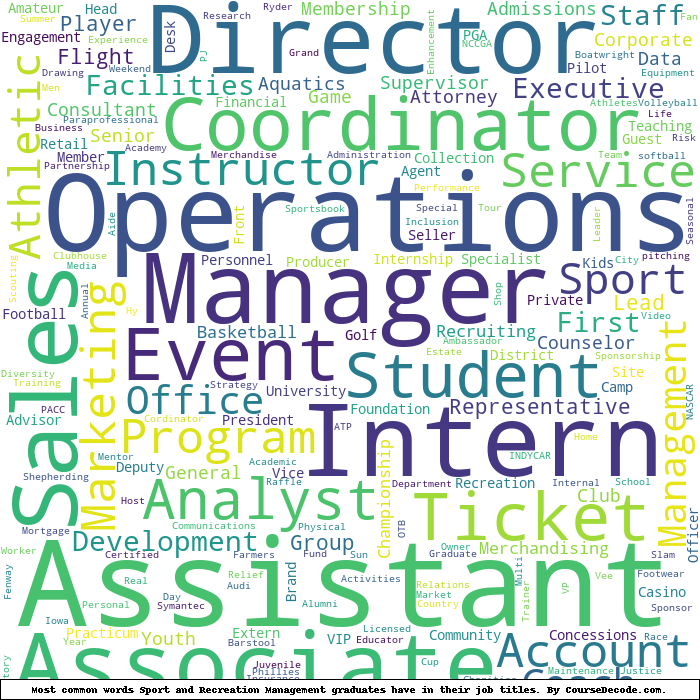
First, some facts. Of the Sport and Recreation Management graduates from Temple University we've analyzed , here's how many have used (or NOT used) their degree in their career:

These are estimates based on AI analysis of 14 LinkedIn profiles (see below).
The verdict? Slightly below average. Overall, with an average relevance score of 63%, Sport and Recreation Management graduates from Temple University have a slightly lower likelihood (-4%) of finding work in this field compared to the average graduate across all fields:
And for comparison, here's the chart for all profiles we've looked at across all degrees.
Also, after graduating, 35% of these graduates have pursued further education other than another Bachelor's degree (such as a Masters degree or other), which is right in line with the average across all fields.
See the details:
|
Relevance score: 47% We think this person has gone into a career only somewhat relevant to their degree. We think this person has gone into a career only somewhat relevant to their degree.
DEGREE INFOGraduated in 2017 from Temple University with a Bachelor of Science - BS in Sport and Recreation Management. Also pursued further education since (see below). JOB HISTORY SINCE GRADUATIONPlayer Development Intern Temple University Jan 2017 - Apr 2017 Director of Volleyball Operations  Temple University May 2017 - Mar 2019 Assistant Equipment Manager  Temple University Mar 2019 - Feb 2022 Footwear Sales Lead  DICK'S Sporting Goods Feb 2022 - Apr 2022 Golf Sales Lead  DICK'S Sporting Goods May 2022 - Present FURTHER DEGREES DONE SINCE GRADUATINGMaster's degreeTemple University 2017 - 2018 ABOUTCurrent Golf Sales Lead at Dick's Sporting Goods King of Prussia location, previously footwear sales lead at the same store. I spent the last three years as the Assistant Equipment Manager for Olympic Sports at Temple University. I am a two time graduate from Temple University, with a master's in Sport Business and a bachelor's in Sport and Recreation Management. I previously worked as the Director of Operations for Temple's Women's Volleyball team and as an Operations Intern for the Temple Football team.I'm passionate about sports and helping others. |
The top 10 most common jobs done by the graduates we've analyzed (ranked most common to least) are:
From the analysis of job trajectories for those who graduated with a degree in Sport and Recreation Management at Temple University, it's clear that alumni have taken on a mix of roles, some closely related to their degree, while others are more tangentially connected. Many of them have wound up in positions like ticket operations, concessions management, or group sales roles within sporting organizations, which do harbor some connection to the field of sport and recreation. These positions often involve customer engagement and operational management but may lack the deeper strategic or management aspects that the degree entails.
On the other hand, there are also instances where graduates have secured roles that directly utilize their education, such as Athletic Directors, event management roles, and various positions within sports teams. This shows that while there are plenty of "in-the-ballpark" jobs (like ticket sales or concessions), some grads are scoring big with positions that require a solid understanding of sport and recreation management principles. But, overall, there seems to be a mixed bag; not every role aligns perfectly with their degree, suggesting that while some alumni stay closely connected to the core competencies of their education, others venture into roles where their degree isn't as applicable on a daily basis. It’s a reminder that career paths can be pretty varied, and those with this degree might find themselves in diverse industries beyond just sports management!
Here is a visual representation of the most common words in job titles for Sport and Recreation Management graduates (this is across all Sport and Recreation Management graduates we've analyzed, not just those who went to Temple University):

When looking at the career trajectories of Temple University graduates with a degree in Sport and Recreation Management, it seems that many of them have followed diverse paths that frequently align with their field of study. For their first jobs out of college, many landed positions such as ticket operations or internship roles with sports teams. This initial step into the industry appears to set a foundation for future roles, often leading to more specialized positions in areas like sales, operations, and marketing within the sports and recreation sectors. Some alumni, however, took a slight detour into unrelated fields—like sales or even law—indicating that while the degree can provide valuable experiences, it's not a guaranteed ticket into a sports career.
As we look further down the line, say five to ten years after graduation, it becomes evident that some graduates manage to build successful careers while others drift into less relevant roles. A number of the alumni have taken significant steps up into management or high-level coordination positions within sports organizations, universities, or even launching their ventures, like an F45 franchise. On the flip side, there are examples of graduates who seem to have shifted gears away from sports entirely, working in various sales or analytical roles that might not directly tie back to their degree. So, while there are certainly successful outcomes in the field of Sport and Recreation Management from Temple University, it's clear that job paths can vary quite a bit, and some graduates might have to explore broader options as their careers develop.
Getting a Bachelor’s degree in Sport and Recreation Management at Temple University can be a pretty manageable journey, especially if you're genuinely interested in the subject. It’s not one of those super intense majors that keeps you locked in a library for weeks on end; instead, it often blends practical experience with some hands-on projects, which can make things feel more engaging and less like a slog. Of course, like any degree, there will be challenging moments—especially if you have to deal with group projects or papers—but overall, you’ll find it’s a mix of fun and learning that many students find enjoyable rather than exhausting. So, if you’ve got a passion for sports or recreation, you’ll likely find the experience more rewarding than difficult!
Most commonly, in the LinkedIn profiles we've looked at, it takes people 4 years to finish a Bachelor degree in Sport and Recreation Management.
When you look at these Sport and Recreation Management grads from Temple University, it's a mixed bag in terms of their earnings. Some, like the graduate who worked their way up from an internship to a General Manager at a parking company, likely started off earning modestly but probably makes a decent salary now with management experience. On the flip side, a few others have had a lot of internships and lower-level jobs, like working as sales associates or fitness instructors, which probably didn’t pay exceedingly well—especially in the earlier years right after graduating. There’s definitely a range here; while some seem to be climbing the ladder towards better pay, others might still be in roles that aren't super lucrative. So, overall, it looks like they’ve got a shot at decent money in the long run, but it might take a few more years for some of them to really cash in.
Here is a visual representation of the most common words seen in the "about" section of LinkedIn profiles who have a Bachelor degree in Sport and Recreation Management (this is across all Sport and Recreation Management graduates we've analyzed, not just those who went to Temple University). This may or may not be useful:

Here are all colleges offering a Bachelor degree in Sport and Recreation Management (ordered by the average relevance score of their Sport and Recreation Management graduates, best to worst) where we have analyzed at least 10 of their graduates:
| College | Score | Count |
|---|---|---|
 University of Iowa University of Iowa
|
72 | 10 |
 Temple University Temple University
|
63 | 14 |